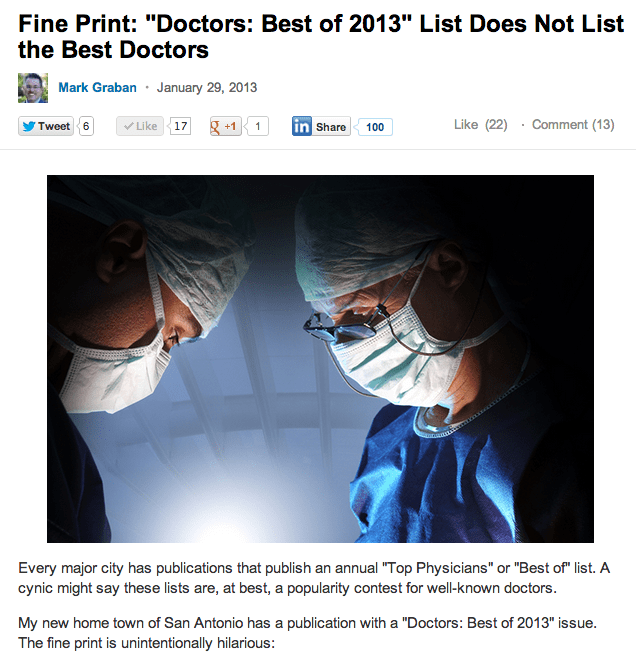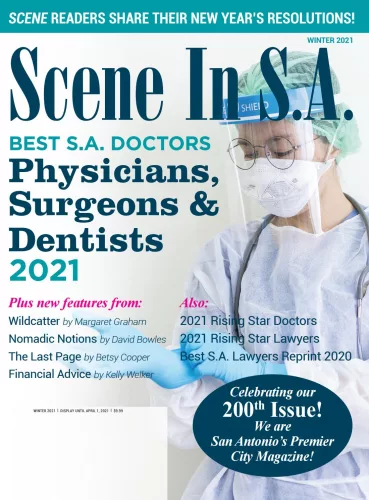Here is a piece that I wrote originally for publication on LinkedIn (but you can read it without an account, I believe).
It's not strictly “Lean” related, but I think it does speak to questions about the changing way customers (patients) will choose value (cost or quality in healthcare). As real quality and cost data becomes available to the public and patients can share their experiences without filters, will these lists go away?
The full text can also be found below the image.

Every major city has publications that publish an annual “Best of” list, which includes everything from pizza parlors to physicians. A cynic might say these “best physicians” lists are, at best, a popularity contest for well-known doctors.
San Antonio, my new home, has a publication with an issue titled “Doctors: Best of 2013” issue. The fine print is unintentionally hilarious:
It reads, in part:
“S.A. Doctors: Best of 2013 is the name of our publication, not a title or moniker conferred upon individual physicians.”
WHAT???
The fine print continues, getting finer, with no apparent sense of irony or shame:
“No representation is made that the quality of services provided by the physicians listed will be greater than that of other licensed physicians.”
Well, of course, since these aren't the “best doctors,” as the magazine points out in its “DOCTORS: BEST OF 2013” issue. Yet, the cover clearly implies they are the “best doctors” listed inside (see the 2021 cover for a more recent example).
So why are these lists and issues published??
Apparently, the old advice of “follow the money” is still helpful.
Issues like this are full of ads from physicians that trumpet they are one of the “best doctors” (yet again) in the city. Apparently, they didn't read the fine print. This issue must be a big money maker for the publication.
Oh, and this doctor isn't necessarily a “Best Doctor” (who isn't necessarily one of the best doctors anyway, per the fine print), but she has merely been nominated. I'd like to know if any doctors in town were NOT nominated.
It's sad that patients have silly lists like this, instead of real data about quality and outcomes, to use when choosing physicians, surgeons, or hospitals.
Is this the best form of marketing the physicians have? Are silly lists like this holding back healthcare quality improvement, or are they just a distraction and a waste of marketing dollars?
Note: this local publication is not affiliated with the BestDoctors.com lists or methodology.
Please scroll down (or click) to post a comment. Connect with me on LinkedIn.
Let’s work together to build a culture of continuous improvement and psychological safety. If you're a leader looking to create lasting change—not just projects—I help organizations:
- Engage people at all levels in sustainable improvement
- Shift from fear of mistakes to learning from them
- Apply Lean thinking in practical, people-centered ways
Interested in coaching or a keynote talk? Let’s start a conversation.










![When Was the Last Time a Leader Around You Admitted They Were Wrong? [Poll]](https://www.leanblog.org/wp-content/uploads/2025/07/Lean-Blog-Post-Cover-Image-2025-07-01T212509.843-100x75.jpg)
Yes, This is what drives the lean experts from manufacturing working in healthcare crazy. Quality, cost, and delivery are pretty much the only things that count in manufacturing. For the most part, these aspects of healthcare are pretty much either indeterminable, invisible, or unimportant compared with “other” unexpressed and inexpressible aspects of customer requirements.
I did a short training exercise for an outpatient service once where customer requirements included things like “a garden atmosphere” and “aroma of premium coffee” in the waiting area and things like a lower false positive rate and cost of the procedure never even came up.
Not that we shouldn’t provide, but good luck value stream mapping “premium coffee aroma”.
I can’t remember the source, but I remember learning about the idea that customers are overmatched when trying to gauge the quality of a professional – that can include lawyers, electricians, doctors, and even lean consultants. If they don’t understand enough (or don’t have enough data) to gauge functional quality, customers fall back on superficial things. Was the electrician on time? Was the doctor nice? Did the lawyer return my calls?
Maybe that’s why patients are so (apparently) impressed with marble flooring and fountains in hospital lobbies?
If it’s impossible to get consensus on what the best cars are on the market (based on defect data, car appearance, sales #’s, etc), what hope do we have of knowing, for a fact, who the top doctors are?
Do patients rate doctors highly because they easily give out antibiotics or pain meds when asked? There is a study out that says the idea of patients rating doctors is actually BAD for quality and outcomes, because the docs are too scared to push back when a patient wants the wrong treatment or tests.
Do the doctors know or care who the best specialists arew?
My primary care physician recently referred me to a specialist. I figured it was because the specialist was really good. Turns out the specialist (he volunteered this, not out of disclosure, but chattiness) that his wife works at the GP’s office (or something). So, maybe the referral wasn’t based on anything close to “who is best?” So, how am I supposed to determine?
Then again, I chose my PCP because they take my insurance and they are reasonably close to my home. I had nothing better to go on to make my choice.
Until we have good data out there, we’re all just grasping at straws, it seems, with magazine lists or otherwise.
A reader, who wanted privacy (but agreed to have it shared in this form) wrote the following:
Posted as a comment by somebody on LinkedIn:
Another comment:
Two magazine people complained that I had it wrong, including this one:
[…] have asked more questions of my primary care provider? Why did she refer me to this GI specialist? Is he a “Best” doctor? Does that […]